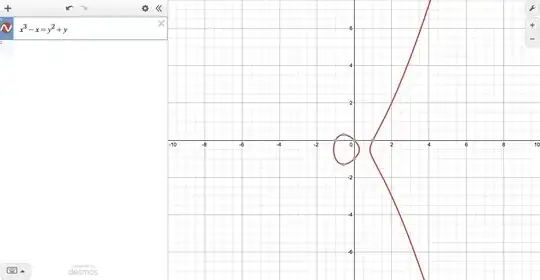Product of Consecutive integers problem
I've begun pondering the following problem, and have found myself unable to advance on it; it goes like this:
Prove that the product of three consecutive integers is never the product of two consecutive integers (with a finite number of exceptions).
Now, I basically have very little idea of what to work with. Obviously, I have two exceptions: {1, 2, 3} ($1 \times 2 \times 3 = 2 \times 3$) and {5, 6, 7} ($5 \times 6 \times 7 = 14 \times 15$).
I formed the following equations:
$x(x-1)(x+1) = y(y+1)$
==> $x^3 - x = y^2 + y$
But I have no idea where to go from here. Graphing this on desmos yields the following elliptical curve, which I don't think helps me:
How do I prove/ this conjecture?
